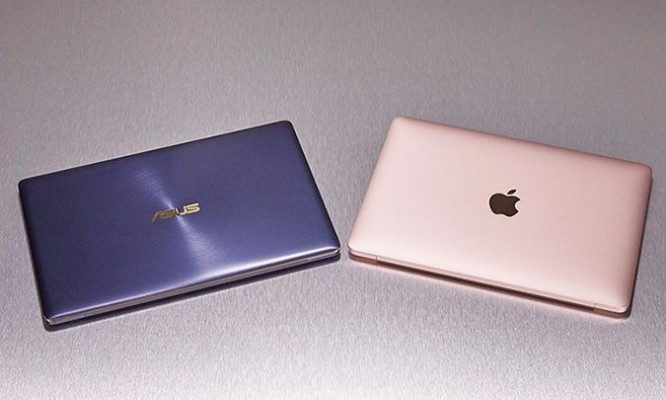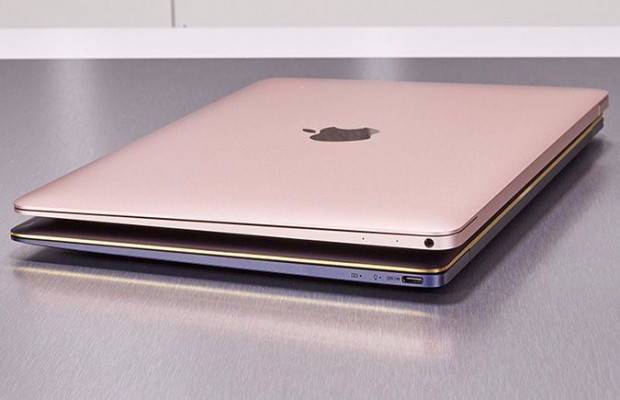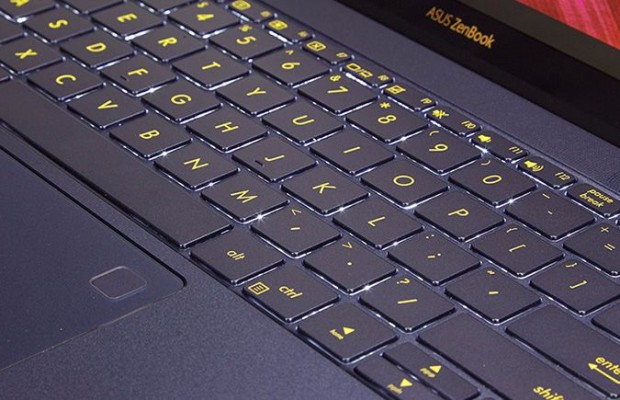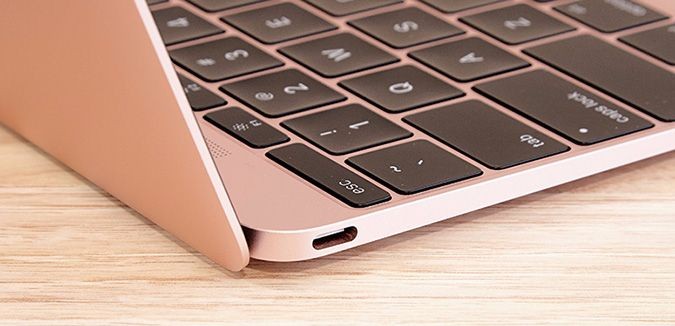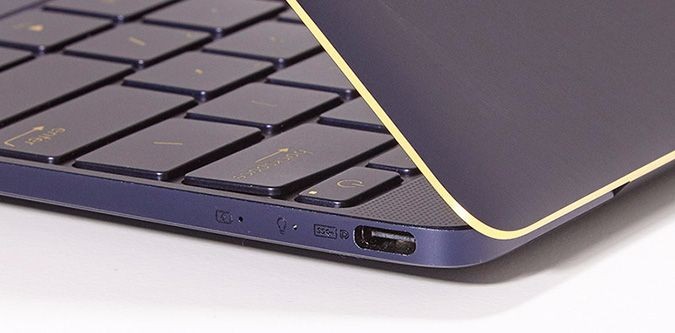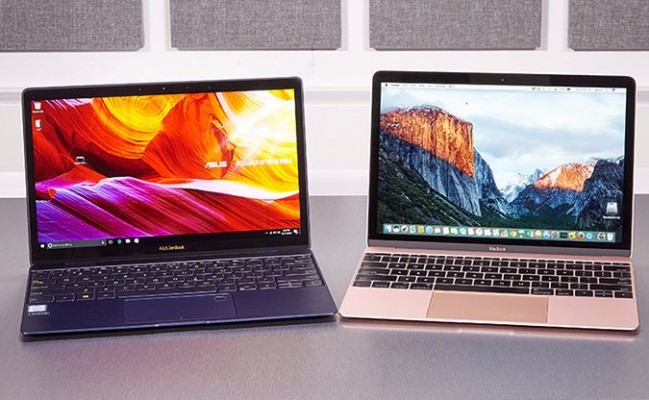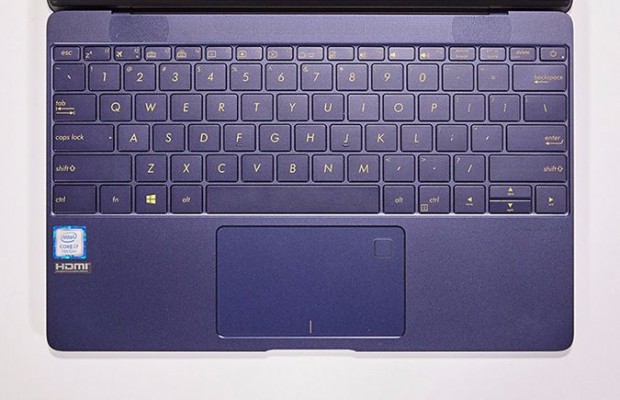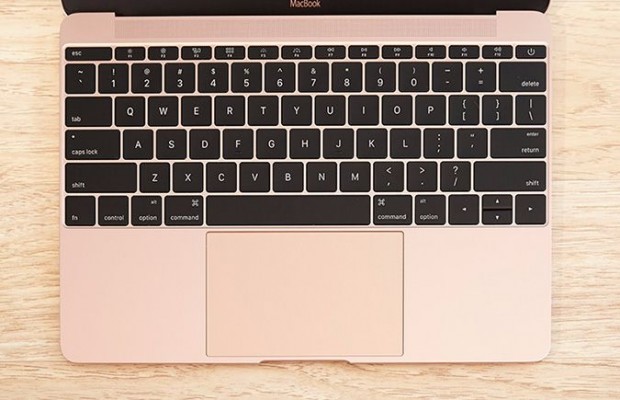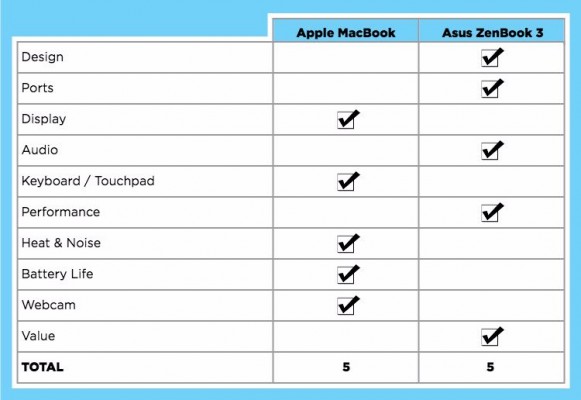Asus ZenBook 3 vs. Apple MacBook: Super Skinny Laptop Face-Off
It would be a mistake to write off the Asus ZenBook 3 as a MacBook clone, because it's not. Sure, it's really thin, like Apple's trendsetting ultraportable, but Asus' machine stands out, offering a full-power Core i5 or i7 processor (no Core M weak sauce here) in a very svelte frame. The ZenBook 3 also has a very colorful 12-inch screen, and offers surprisingly robust audio, given its small size.
The MacBook is the trendsetter for a reason, though: It offers a sharp display, surprisingly good ergonomics and excellent battery life. Read on to see which system deserves your money.
Design
Both the MacBook and ZenBook 3 are among the thinnest and lightest laptops on earth.
Made of 6013 aluminum alloy, which Asus said is 50 percent stronger than typical aluminum, the ZenBook weighs 2 pounds and measures 11.65 x 7.53 x 0.47 inches thick. The unibody aluminum MacBook is ever so slightly heavier and thicker at 2.03 pounds, and it measures 11.04 x 7.74 x 0.14-0.52 inches.
The MacBook comes in four colors, including Rose Gold, Space Gray, Gold and Silver, and the ZenBook 3 comes in Quartz Grey, Rose Gold and Royal Blue. I don't like that you have to pay $500 extra to get the blue on the Asus. Still, I love how the blue carries over to the keyboard, as well as the gold, diamond-cut edging. Plus, the Asus' touchpad has a fingerprint sensor that supports Windows Hello, which makes it easy to log in.
Winner: ZenBook 3. The blue version will turn more heads.
MORE: Best Ultrabooks (Thin-and-Light Windows Laptops)
Sign up to receive The Snapshot, a free special dispatch from Laptop Mag, in your inbox.
Ports
If you like to plug in more than one peripheral at once, you won't like the MacBook or ZenBook 3.
They both have only a single USB-C port, which is used for charging. There are a growing number of USB-C accessories, but you'll want to use a dongle to accommodate most of your existing devices.
The good news is that Asus includes a Mini Dock in the box, which has both an HDMI output and traditional USB port, in addition to a USB-C port for charging. Apple charges $79 for its AV Multiport Adapter.
Winner: ZenBook 3. At least Asus includes a dock.
Display
The 12.5-inch screen on the Asus ZenBook 3 is bigger than the MacBook's 12-inch panel, but it's not as sharp. It packs 1920 x 1080 pixels, compared to 2304 x 1440 pixels on the 12-inch MacBook's display.
Asus does include special True2Life technology that you can turn on and off via software, which is designed to increase the sharpness and contrast of videos, and we found that it worked well.
The ZenBook 3's display is a bit more colorful, covering 111 percent of the sRGB color gamut versus 107 percent for the Apple. With a Delta-E rating of 1.08 (0 is perfect), the ZenBook's screen has colors that are slightly less accurate than the MacBook's.
Last but not least, the MacBook's display is brighter, hitting 327 nits on our tests; the ZenBook 3's 309-nit brightness is above the ultraportable average, but below the Mac's.
Winner: MacBook. While it's less colorful, the MacBook's screen is sharper and brighter.
Audio
I fired up Spotify and listened to some U2 and Chris Stapleton on both the MacBook and ZenBook 3, and the Asus had the edge. While the MacBook's speaker produces more volume, it sometimes struggled with the high notes, which sounded harsh at maximum volume.
The four-speaker system on the Asus delivered a more balanced performance on such tracks as “I Still Haven't Found What I'm Looking For,” with the jangling guitars nicely complementing Bono's soaring vocals. Also, unlike with the MacBook, you can adjust the sound profiles on the ZenBook using the AudioWizard app.
Winner: ZenBook 3. More speakers = more balanced sound.
MORE: Best Asus Laptops
Keyboard and Touchpad
When you look at the numbers, the ZenBook 3 would seem to have the superior keyboard.
It offers 0.8 millimeters of travel, which is more than the MacBook's 0.5 mm. However, the ZenBook's keys felt mushier as I typed. The MacBook feels flatter and stiffer at first, but its unique butterfly mechanism offers a more solid feel.
The MacBook also offers a roomier touchpad at 4.4 x 2.7 inches versus 4.1 x 2.4 inches for the ZenBook. More importantly, the Force Touch trackpad on the Mac provides a smoother scrolling experience and more accurate cursor navigation (it's less jumpy).
Winner: MacBook. The Asus is good, but the MacBook is better.
Performance
The MacBook and ZenBook 3 use different processors, with the Asus starting with a full Core i5 7th Generation Kaby Lake CPU, 8GB of RAM and a 256GB SSD for $1,099. We tested the $1,599 model, which steps it up to a Core i7 chip, 16GB of RAM and a 512GB SSD.
The MacBook starts with a low-power Core m3 processor, 8GB of RAM and a 256GB SSD, and we reviewed the faster Core m5 model with the same amount of RAM and a 512GB SSD.
On Geekbench, which measures overall performance, the ZenBook 3 scored 7,647, which far outpaces the MacBook (5,906).
The Asus also packs a faster SSD, as it turned in a transfer rate of 508.92 megabytes per second. That also beats the MacBook's 355.9 MBps.
The only test where the MacBook outshined the ZenBook was our spreadsheet test, which pairs 20,000 names and addresses. The Apple took 3 minutes and 11 seconds, but the Asus wasn't that far behind at 3:34.
Winner: ZenBook 3. It's simply more powerful.
MORE: Best Apple Laptops
Heat and Noise
Because the ZenBook 3 has a Core i5 or i7 chip instead of a more power-efficient Core M processor, it needs a tiny fan to dissipate heat. It works well, too: both the keyboard and touchpad stayed below 91 degrees after streaming video. The bottom of the system hit 97 degrees, which is only a bit above our 95-degree comfort threshold.
The fanless MacBook got a little toastier on the bottom, hitting 100 degrees.
Winner: MacBook. The Asus runs cooler, but it's also louder.
Battery Life
This is the biggest reason to go with the MacBook. On the Laptop Mag battery test, which involves continuous web surfing over Wi-Fi, the Core i7 ZenBook 3 lasted 7 hours and 5 minutes. That's not bad, given how thin this system is, and we would expect moderately better endurance from the less powerful Core i5 version.
However, the MacBook lasted a very strong 9 hours and 38 minutes, which is more than enough for a cross-country flight.
Winner: MacBook. It has significantly more staying power.
Webcam
While both the MacBook and ZenBook have low-resolution cameras, the ZenBook 3's shooter is truly awful.
The selfie I shot in my office was quite blurry and delivered inaccurate colors; it looked like I went through a spray-tan booth.
The MacBook's image looks fairly fuzzy, too, but at least the hues are more realistic.
Winner: MacBook. The lesser of two evils.
Value
The Asus ZenBook 3 starts at a lower $1,099, which beats the MacBook by $200. You also get more for your money in terms of performance, because you get a Core i5 chip instead of the Core m3 CPU you get on the Apple. Asus also includes a dock for attaching peripherals, whereas Apple charges $79. Both systems start with 8GB of RAM and a 256GB SSD.
MORE: Best Laptops Under $500
Those willing to pay a premium can choose the $1,599 ZenBook 3 in fetching Royal Blue, which also steps you up to a Core i7 processor and 16GB of RAM. The $1,599 MacBook gives you a roomy 512GB SSD like the ZenBook, but Asus' splurge configuration also includes 16GB of RAM, while the MacBook stays at 8GB. If you want a Core m7 processor, you can pay Apple $1,799.
Winner: ZenBook 3. More oomph for your money.
Overall Winner
The ZenBook 3 and MacBook are both very strong ultraportables, but their strengths are in different areas, which is why this match ends in a draw. Still, there are clear winners here, depending on your priorities.
Get the Asus ZenBook 3 if you want better performance and richer audio, and you want better specs for your money. The MacBook is the ultraportable to get if you prefer longer battery life, as well as a slightly better typing experience, a sharper screen and better webcam.

